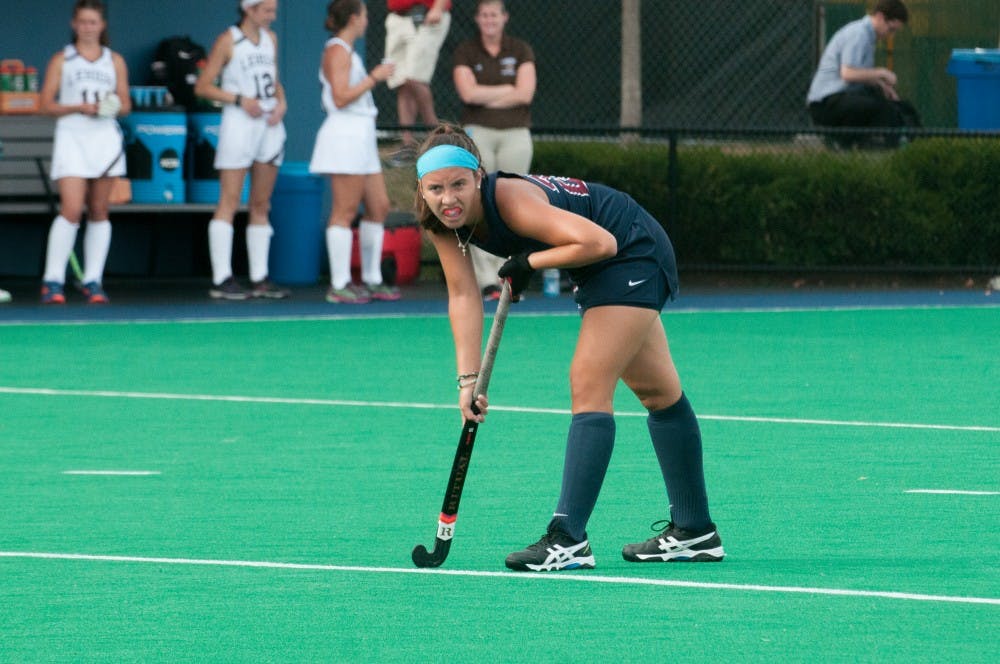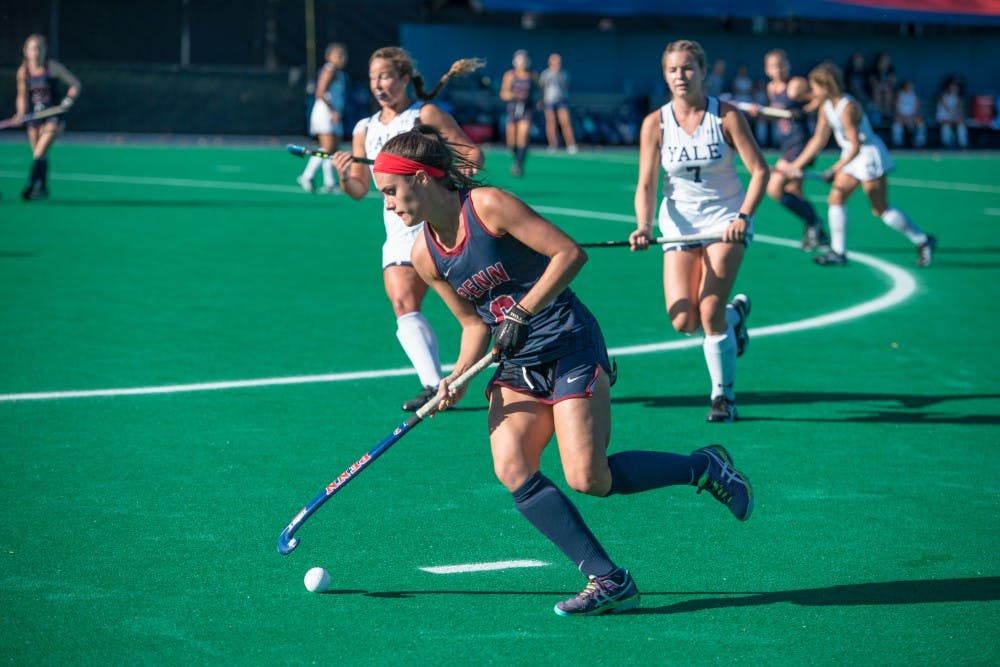
Senior attack Gina Guccione and the Penn field hockey offense have seen their scoring numbers decline, but the team is still finding success in lower-scoring games.
Credit: Nick BuchtaNothing about the 2017 season has been ordinary for Penn field hockey. Once in the running to win the Ivy League championship and make an appearance in the NCAA Tournament, the Quakers are all but eliminated from winning the conference with two weeks left in the season.
However, that has not stopped the team from showing signs of a potential transformation.
The Quakers' current record (8-6, 3-2 Ivy) and performance are not indicative of their recent run of play or current composition. After a win over No. 10 Syracuse, the Quakers proved that they still have the same fight as in previous years, but the real surprise comes when looking at how they have been winning their games — usually led by a high-octane attack that uses a potent offense to keep itself in games, the Quakers are scoring fewer goals this year while conceding far fewer.
The difference in scoring – 1.79 goals per game in 2017 versus 2.59 in 2016 – cannot be chalked up to graduations or a changing lineup. While 2016 graduates Elise Tilton and Claire Kneizys were critical to the program’s successes, the two of them combined for only nine of the team’s 44 goals in 2016 and assisted just twice.
Moreover, the change in scoring is unrelated to any major changes in the lineup. The team’s three forwards – seniors Alexa Hoover and Gina Guccione plus junior Sofia Palacios – remain the same. Hoover and Guccione have started every game up top, with Palacios returning to her attacking post after a brief spell at center defensive midfield. The three of them are scoring 1.14 goals per game this season compared to 1.53 in 2016.

Coach Colleen Fink has reiterated over the course of the season that while the team’s reduced shot counts – 10.6 per game as opposed to last year’s 17.1 – is something to work on, the real issue is about shot quality.
“We need to work on the power of our shots. We’ve outshot several of our opponents but I don’t love that statistic,” Fink opined. Ultimately, she later summed up that it will come down to the quality of the team’s shots relative to the opposition.
Reduced shot count aside, perhaps the most telling reason for any drop in scoring this season is the team’s schedule. As the Quakers have progressed from a mid-tier Ivy talent to a nationally-ranked team, their schedule has significantly improved.
In 2016, the Quakers faced off with four ranked opponents. In 2017, the Quakers will likely finish the season with seven. Moreover, the Quakers’ schedule this year does not feature the opponents from last year who conceded a lot of goals to the Red and Blue, including LIU-Brooklyn (which lost 6-0), St. Joe’s (which conceded 5 goals), and Villanova (which allowed 6).
With just three games left in 2017, the goal total is unlikely to revert back to its usual total of more than two per game. However, both Fink and some of the team’s leaders have looked at ways that the team can work on jump-starting its scoring ability.
“There’s no doubt our offense is not producing the way we want to, and they’ll be the first to admit that.” Fink said. “They need to execute their corners more efficiently and have more quality in their shots.”

Captain Jasmine Li has her own take on the situation from the back of the of the midfield diamond.
“From my position, I try to give as many opportunities as possible to give the forwards as many shots as possible,” Li said, noting that most of her shots are taken outside of the circle in hopes of leading to a scoring opportunity for the team’s attacking unit.
Although the offense has been less productive this season, the defense has improved to a point not seen in years. In past years a liability, the backline has turned in several stellar performances in 2017 and kept the team in several games when the offense has stalled.
“We’ve been working on it for 15 to 20 months, and it’s finally starting to come to fruition with that mentality,” Fink said, praising the unit's increased composure and confidence.
As the two returning starters to the group from last year, Li and center back Paige Meily have proven integral in the defense’s recent successes. Li is a four-year starter for the program but only recently made the move from left back to center defensive midfield. But for Li, that transition was “great.”
“Great as in I had to learn a lot of different skills to be successful at a different position,” Li said.
“But I think I’ve adapted pretty well.”
Oftentimes the last line of defense before the goalie, Meily has also been a saving grace for this year's defense. As a sophomore, she transitioned to center back in 2016 in a move that would suit her strengths as a player.
“Back when I switched I had a lot of support from Jasmine at left back,” Meily said, also adding that Kneizys, the team’s most recent center back, and the coaches supported her through the switch.
Ultimately the move would allow Meily to leverage her strengths on defense and allow the Quakers to slow down opposing offenses at an impressive rate. In 2017, the Red and Blue concede just 11.4 shots per game compared to 13.6 in 2016. That shot suppression success has also led to a 20% reduction in goals against per game.
But anybody watching the Quakers this year would be remiss not to have noticed the play of the team’s two outside backs, freshman Reese Vogel and junior Karen Seid.
Vogel has not only shown that she can consistently play an important role as a rookie, but she has also proven that she could be leading the team’s defense in her next three years at Penn. She has certainly earned the praise of her teammates.
“I’m really grateful to have Reese join the team as a freshman and contribute so much,” Li said of the team’s right back.
On the left side is Seid. A converted midfielder, Seid is playing defense for the first time and has found remarkable success. Her speed and physicality make her a tough matchup when teams attack Penn’s defense.
“She uses her strengths to best position herself to play successfully at that left back,” Li said.
When paired with the stout defensive play of Meily, the two outside backs have incredible speed that can make attacking the Quakers a bit of a nightmare. With sophomore goalie Ava Rosati now at the helm for the Red and Blue, it is now more important than ever to avoid any sort of trial by fire for the new starter.
The team trusts Rosati, but in a tough Ivy League season, it is always crucial to limit the number of opposing scoring chances.
“We trust her,” Li said. “And even in ourselves we have increased motivation to not even let balls get to Ava.”
In the last three games of the season, the Quakers will have a chance to show more signs of life from the offense while maintaining a solid defense. On a Fink-led squad, the offense will certainly find its way again. On the other hand, the recent tightening of the defense is an increasingly promising sign for years to come.
The Daily Pennsylvanian is an independent, student-run newspaper. Please consider making a donation to support the coverage that shapes the University. Your generosity ensures a future of strong journalism at Penn.
Donate



